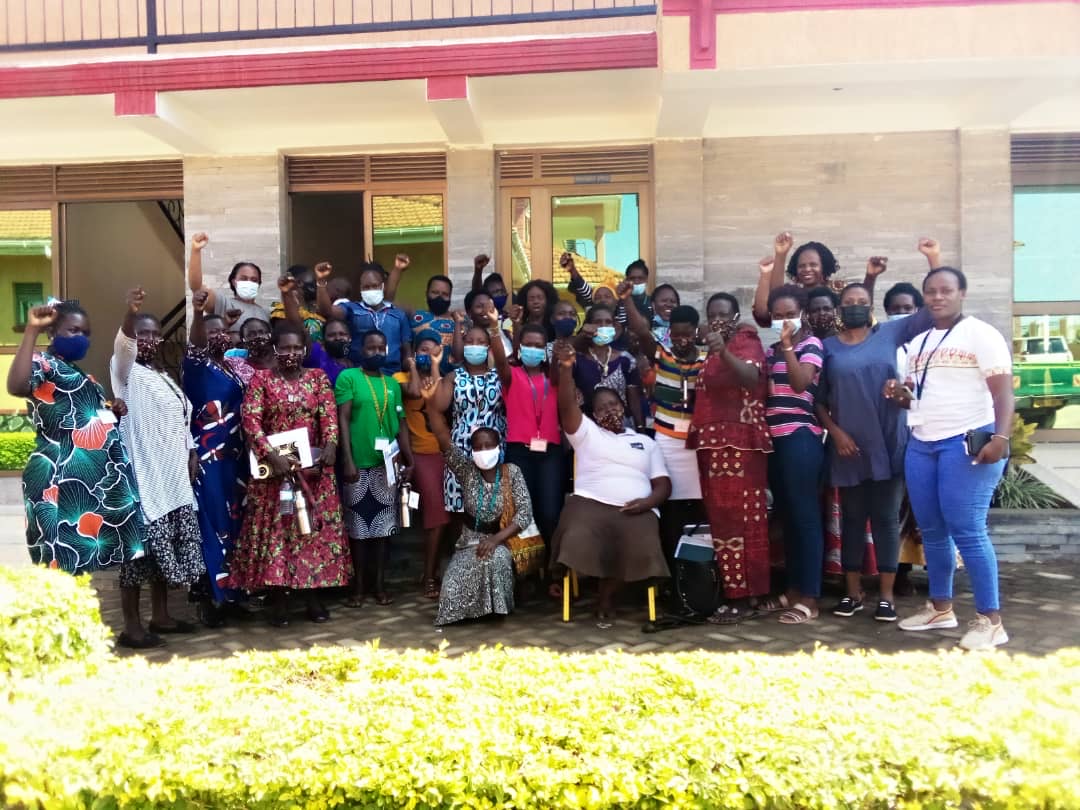Monday, January 10th, 2022 | By

Rural women have called for climate justice and protection of land- which is central to their livelihood. This was during a feminist school for rural women in the Northern Uganda that was organized by National Association of Professional Environmentalists (NAPE) between 14th and 18th November, last year.
According to rural women, land rights for rural communities, specifically women, are being undermined by the recent wave of land rush by investors who are purchasing or leasing land for mining, monoculture or mega infrastructure development aimed at profit maximization.
MelaChaponda, an inspiring feminist from Zimbabwe joined a feminist school virtually said the development model based on capitalism has robbed rural communities of their livelihoods, their sustainable food systems and their climate justice.
She said there is need for women to challenge the oppressive religions, cultures and capitalistic systems that have degraded women and robbed them of their rights to natural resources and their livelihood.
“Women should ask themselves why they end up being treated as second class citizens yet both men and women used to depend on land and other natural resources happily with little gender variation; ask themselves how people ended up using culture, religion and globalization to manipulate and leave the women behind; and also ask themselves why women do much of work to sustain life like breastfeeding, producing food and cooking but the work is not appreciated. All these are happening because capitalism continues to dominate in the way people think and behave. The love for profit maximization which is fronted by men has led to exploitation of natural resources that women have lived on for ages hence degrading women,” MelaChaponda said.
She said women should say no to food systems that undermine sustainable traditional food sovereignty systems.
“Start rethinking of community based solutions to climate crisis and let communities know that climate crisis is real. Stop using pesticides, Genetically Modified Organisms are not solutions to climate change. Let us promote traditional seeds and ensure that the communities stick to that. Let’s take alternatives like agro ecology that does not destroy the ecosystem. Let us not allow our food production systems be driven by capitalists needs but our own needs,” she said.
The women said it’s high time they challenged the systems that undermine their rights and mobilized to change the status quo and demanded for land and climate justice by building a collective power.
“There is power in numbers to challenge what is happening. Let’s look at solutions not challenges,” Lilian Tamale, the Chief Executive Officer, CivSource Africa, a partner to NAPE.
They are demanding that strategies to address the systematic crises caused by extractive development models recognize the disproportionate burden on rural women and also need people-driven solutions and eco-feminist development alternatives.
“The government is doing nothing! A lot of nothing! When they were constructing Karuma dam, the government promised to build a good hospital as part of corporate social responsibility to communities but they just put a building with nothing in it and even people are suffering with electricity black outs. That’s why we need to mobilize a critical mass to fight these injustices,” said Connie Atoo from Lango
During the school, the women vowed to stand up and speak loudly about the injustices caused by capitalistic development models fronted by investors in mining, monoculture and mega infrastructure.
They vowed to form a collective power to fight for food sovereignty, eco-feminist development alternatives that ensure sustainability of natural resources, access to land, recognition of women’s roles and rights in agriculture and farmer’s control to indigenous food.
“We need to come together as one, our voices need to be heard and this can only be achieved through building a women’s movement. Let’s rethink of how the society has degraded our women and we work together to look for solutions ourselves,” said Harriet Apiyo, an activist from Northern Uganda.
SostineNamanya, a gender and food security officer from NAPE said the feminist school was aimed at creating an enabling environment for feminist engagement, strengthening women leadership and enhancing eco-feminist movement in Uganda.
The feminist school was organized by NAPE with support from CivFund
Copyright ©2024 Community Green Radio . All Rights Reserved. Designed : Lwegatech